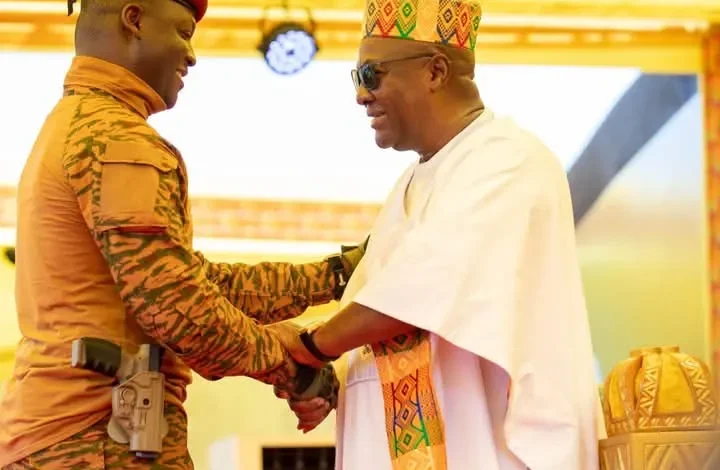Ghanaians’ Celebrations of Burkina Faso’s Leader: A Wake-Up Call for African Leaders to Prioritize Governance
Youth's Cheers for Traore Highlight Growing Discontent with Governance Across Africa

- Traore, who has since transitioned from a military leader to president, received an enthusiastic reception, particularly from Ghana’s youth
- This response, however, tells a deeper story of growing discontent with leadership across the African continent.
- African leaders must prioritize the welfare of their people to ensure long-term stability, growth, and progress.
The atmosphere at Black Star Square in Accra was charged with energy on January 7, 2025, as Ghanaians gathered to celebrate the inauguration of President John Dramani Mahama.
However, it was the unexpected presence of Captain Ibrahim Traore, the leader of Burkina Faso’s recent coup, that truly captured the attention of the crowd.
Traore, who has since transitioned from a military leader to president, received an enthusiastic reception, particularly from Ghana’s youth. His appearance at the event sparked widespread admiration for his boldness in challenging the political establishment in his home country.
This response, however, tells a deeper story of growing discontent with leadership across the African continent.
While the African Union (AU) has condemned the coup, highlighting the undemocratic nature of his rise to power, the enthusiasm shown by many young Ghanaians suggests a stark contrast.
The celebration of Traore underscores the frustration many African youths feel toward ineffective governance, corruption, and political stagnation. The message is clear: African leaders must act to meet the needs of their citizens or risk losing their legitimacy.
The loud cheers for Traore at Mahama’s inauguration send a strong signal to Africa’s political leaders that the youth can no longer be ignored. Unemployment, lack of access to quality education, poor healthcare, and a lack of economic opportunities are fueling disillusionment among young people. If these issues remain unaddressed, the youth will continue to demand change, possibly through more radical means.
President Mahama’s return to power following a decisive victory in the 2024 elections also marks a shift in Ghana’s political landscape. The NPP, which suffered a dramatic loss after losing nearly two million votes in their traditional strongholds, has been sent a clear message. The defeat signals that Ghanaians, particularly the younger generation, are no longer willing to tolerate unfulfilled promises and inadequate governance.
While Ghana has a history of political instability, the current climate suggests that citizens prefer to use democratic means—specifically their votes—to bring about change. The preference for the ballot over violence signals the growing maturity of Ghana’s democracy, despite rising frustrations with the pace of political progress.
The celebration of Burkina Faso’s leader serves as a cautionary reminder to African leaders. Citizens are demanding access to basic services such as clean water, healthcare, and education. The youth, especially, are calling for policies that address economic challenges, create jobs, and promote social inclusion.
Mahama’s second term presents an opportunity to focus on these pressing issues. His administration must work to deliver tangible improvements in the lives of ordinary Ghanaians, restore hope, and demonstrate that democracy can bring real, positive change.
The strong youth support for Traore and the electoral rejection of the NPP signal a broader trend across Africa: a desire for accountable, responsive leadership. African leaders must recognize the urgency of addressing corruption, unemployment, and inequality. Failure to do so risks alienating the continent’s young population, who are increasingly demanding better governance.
As Ghana embarks on this new chapter under President Mahama, it is vital that the political class learn from the lessons of the 2024 elections. Democracy is not merely about holding elections; it’s about fulfilling the promises that improve the daily lives of citizens. African leaders must prioritize the welfare of their people to ensure long-term stability, growth, and progress.
In conclusion, the events at Black Star Square are not only a celebration of democratic change in Ghana but also a stark reminder to African leaders: the youth are watching, and they will hold leaders accountable, either through their votes or through their actions.





